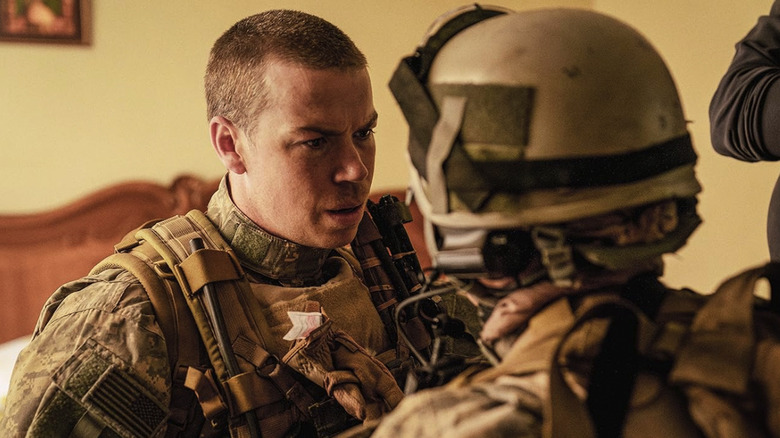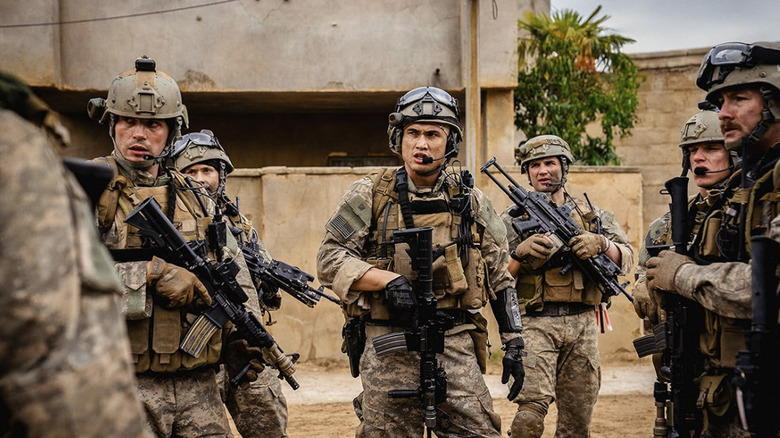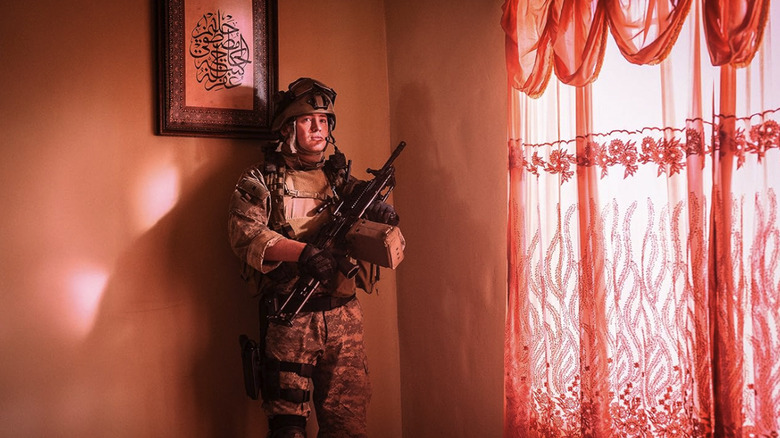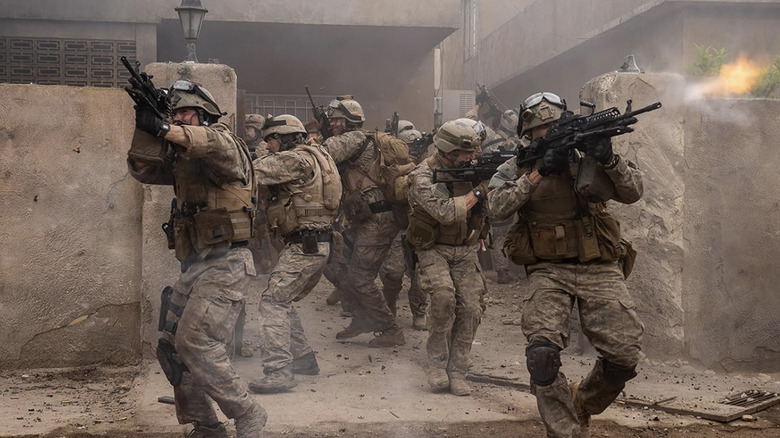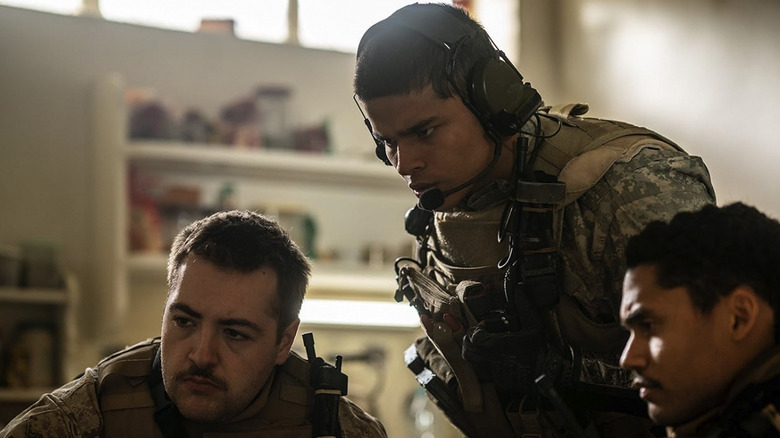How Warfare Directors Alex Garland And Ray Mendoza Made One Of The Most Intense War Films Ever [Exclusive Interview]
"Warfare" is unlike any war movie ever made, and perhaps unlike any film you've ever seen. Largely told in real time and in blistering detail, the film recounts an operation gone horribly wrong during the Iraq War circa 2006, as a team of Navy SEALs find themselves under siege against an enemy force. The events are recounted without a traditional Hollywood structure, eschewing narrative to focus on minor details and striking moments. This is what happened, the film says. Make up your own mind about it.
And while filmmaker Alex Garland is already known for provocative and button-pushing movies like "Ex Machina" and "Annihilation," he is only one part of the equation here. He co-directs the film with Ray Mendoza, a military veteran who worked as an advisor on Garland's "Civil War" and who lived through the events depicted in "Warfare." As both filmmakers told me during a recent interview, depicting the unpolished reality that Mendoza and his fellow soldiers survived was the biggest priority during the making of the film.
I sat down with Garland and Mendoza following an early screening of "Warfare" and found two men entirely on the same page with their vision. The goal, they told me, was to depict the truth of combat as closely as possible without supplying an obvious message. The film's goal is to immerse the audience in the memories of those who endured the firefight, and to let the frequently disturbing and contradictory nature of what went down speak for itself.
Note: This interview has been lightly edited for clarity and brevity.
Civil War was crucial to this film getting made
The movie's one hell of an experience. I've really never felt a war film like this before. I would really like to talk about the conversation or the moment where you two realized "we should work together." How'd that happen?
Ray Mendoza: Started with him.
Alex Garland: Towards the end of "Civil War," there's a sequence where some soldiers fight their way down a corridor towards the Oval Office, and the way Ray constructed the action in that sequence and the behavior of the soldiers as they moved down, he had a particular tone to it, which was essentially a tone based on lived experience. And then in the way of cutting that didn't use time compressions or the sorts of things we almost instinctively do when cutting something together, [where] things move more quickly in film than they do in real life. So we just, in the edit, kept it real-time. As soon as I saw that, there was something really interesting that floated out, probably invisible to a lot of people watching, but it's just the kind of electricity of something slightly more documentary or truthful.
So in post I called Ray and I said, "Are you interested in making a film that would last an hour and a half or an hour 40, thereabouts, and would attempt to be completely faithful to a true sequence of events and we wouldn't distort them or compress them or change them?" The thing I often end up saying in a sort of illustrative way is if for five minutes nobody did anything, they just sat there silently, that's what the camera would do. "Is there a story that you would feel comfortable telling if we took that kind of approach?" And it turned out there was a story Ray had wanted to tell for many, many years for all sorts of reasons, largely though personal reasons. From that moment, I'd say about halfway through post-production on "Civil War," we started trying to figure out how we would make this, how we would go about it.
So what was that like for you, Ray, when you got that phone call? How'd that feel to be approached about this project?
Ray Mendoza: Well, I felt honored. I was like, "Oh, awesome." But yeah, I had to think about it for a bit. There's lots of stories that resonate through all branches of the military, especially a war as long as it was, 20 years or so. And yes, I needed to figure out one where there was a set of parameters of this window. He's like, "Hey, it's an hour and a half. We can't expand it, we can't compress it, we can only slide it." So with those parameters, you start to limit it because some firefights last for days.
So then I knew of this story about Elliot and I really had to ask myself was I ready to dive into the emotional components of the movie? Because I knew it was going to come out. So I called the guys that were there and they were involved in it and I knew I was going to need them to speak about it. I had a lot of phone calls.
And yeah, there's some trust components there with Alex, because in the film world, sometimes these stories can get hijacked. So if that was going to be the case, that wasn't a risk I was going to be willing to take. But in this case, we had some history and I really trusted Alex in that regard and I made the decision that it was time.
Warfare uses sound in fascinating ways
There are moments and images in this film that are so specific. A wounded soldier wakes up and sees that his leg's on fire, or a guy looks up and sees the cables stretched across the sky. How many of those images were drawn from speaking to people who were there and realizing theyI remembered those very specific images?
Alex Garland: So we were interviewing Joe and he said, "I sat up and looked down and my legs were on fire." You know the [Dogme '95] movement?
Yes.
Alex Garland: Yeah. So this was kind of like a Dogme film in a sense, except the dogma rule was nobody is allowed to just invent something and anything that makes its way into the film has to be you can source it from a firsthand account. So that doesn't just limit, it sort of ends my involvement in narrative, as it were. Same with the studio, same with the actors. An actor could not say, "I feel motivated to get up and walk to the window," because if there is one of the people there saying, "You didn't walk to the window, you sat right there," well that's the end of the conversation. So we did not invent.
Also, I don't want to bulls*** about that. You will see things that are in a way inventions, like someone scratches the back of their head or the exact words used in a bit of dialogue in a dialogue exchange. So we know the dialogue exchange happened, but you can't be exactly sure the words arrived in this order, if you see what I mean. But it's not exactly invention, it's more like as good as you can do under the circumstances of an event that took place 20 years ago and not the only, but the primary source of information being memory. There was actually some other sources, but it was mainly memory.
Was there a moment or a detail that was especially important to you? Where you said "this was one that we're getting in here no matter what"?
Ray Mendoza: There is a lot. I mean, I try to hit it for each person. So when you talk to all the guys that were there, there's their moment and I try to put all of those in there. For me, it was when post-IED and [Kazo is being pulled] up the driveway. There were a few takes, but Elliot was there, I was there, and there was just one take. The sound, the way [he] was struggling, the light, how much smoke there was, it was perfect — as in, too perfect. And it kind of opened up this years of compartmentalization of these emotions and feelings that I was afraid was going to happen, and it did. So that was a powerful moment for me. Therapeutic as well. I think being there with Elliot [was] maybe the only way that I could kind of deal with that because of how intense, how much that event really changed my life. Not only physically, but just emotionally.
The way the film uses sound to relate POVs is really interesting, because after the IED explosion, sounds are muted in the moment. But when the film cuts back to a larger scene, with the full ensemble again, we start hearing the screams. We realize the sound lets us into the heads of individual characters. How did you make this choice?
Alex Garland: One thing I would say is that when you get memories, what you're getting is a subjective state. We are given a very clear account of the subjective state: "This is what it felt like to me." So then the job is just how do you show that subjective state? And because you have several subjective states, then it creates a kind of patchwork within the film.
The way it would work is something like this. So Ray says, for example, he's remembering what happened and he's been in close proximity to an IED explosion. He's been knocked unconscious, he's suffering from a concussion, and one of the things that's happening is he is kind of phasing in and out of states of awareness. So okay, one can represent that by someone glazing out and sound disappearing, but not everybody is feeling that. So how do you cross-cut, when do you cross-cut? What are the different audio spaces that correctly represents this person or correctly represents that person? Who in the aftermath of the explosion has the tinnitus type sound? Who can hear nothing?
Here's the example that I thought was best and clearest, and then what the film did was just explicitly try to reproduce exactly what was said. Ray was wearing headphones. The headphones were broadcasting radio chatter the entire time. But after the explosion, Ray was not aware of the sound of that radio chatter, but he could hear someone screaming. That's what his mind remembers in the moment. So he goes out, ultimately he finds Elliot, he pulls Elliot back. As he's pulling Elliot back, he's being shot at and suddenly with an awareness of the surroundings, which is to do with the awareness of being shot at, the awareness — not the sound, but the awareness of the sound – of what's coming in over the cans suddenly comes back into his brain and is part of the memory of this moment. So that's exactly what the film does. That's when the sound of the radio, the sort of cacophony sound of the radio, comes back in. So we just tried to repeat what we were told, whether it was from Ray or Joe or Elliot or any of the other people involved.
Being as honest as possible about what war is like
I haven't served, but friends and family in the military have described being a soldier as deathly tedious and boring until it was suddenly terrifying, and I think this film reflects that. Can you talk about how that statement feels to you?
Ray Mendoza: Accurate. Especially when you do it every day for six or 12 months, it's very much ... it actually puts you more on edge. The quiet moments are more freaky. We're just like, "Just shoot us already," because we know what's going to happen. Sorry.
There's never a moment in the film where a character looks at the camera and says, "Here's how you should be feeling." There's also never a moment where the film is trying to raise a flag. And I feel like there are people who are going to say, "This is not the pro-military movie I wanted," and some will say, "This is not the anti-war movie I wanted." Surely you knew you would be ruffling feathers on both sides when you made this.
Alex Garland: Yeah. I couldn't care less about that, to be honest. I think the way I personally see it is this: Film is a broad church. Books are a broad church, theater, everything. It's all a broad church. You just need to accept that. Within that broad church, you could have a film about combat, which is attempting to be as honest and faithful as possible, and I would have to say that honesty has to involve a kind of neutrality in the presentation of facts, I would argue — or at least there is one pew within that church which is reserved for that. Then you can have someone else who presents facts because they have an agenda and there can be someone else who decides, "I'm not going to present any facts because that's my agenda." And so it goes on.
This is just the space we choose to occupy with this film. The reason being that there is an inherent value in just trying to be as honest as you can about what war is like and to listen to the experiences of people who have actually been at war. Just to simply listen to it and take it in, sort of take it into account. It's almost incumbent on us, I would say.
Again, it doesn't have to be the whole picture. You can have another movie which is doing a whole other thing, but that's what this movie is trying to do.
Yeah, to paraphrase, it was Truffaut who said –
Alex Garland: Yeah. No such thing as an anti-war movie.
But I think this one comes close.
Alex Garland: I've got to say, I think "Come and See" is an anti-war movie, and I think "Paths of Glory" is an anti-war movie. I do understand the point, it's a legitimate point. He's talking about a general state, which is that film tends to romanticize and dramatize, which it does. And that's a perfectly reasonable — I think he was probably, he was being more glib than we give him credit for. Maybe "glib" is not the right word either, but just more relaxed, making a general statement.
There've been anti-war films before. I personally think it's hard to give an honest account of war that isn't anti-war in as much as that it would say this is best avoided. It would simply be better if this didn't have to happen. Sometimes it does have to happen. There will be circumstances in history where it was unavoidable, and other circumstances in history where it would've been avoidable if people had been more honest about what it entailed.
The goal of Warfare is to show a factual presentation of events
In the film, we see these men acting under extraordinary circumstances. They're stressed, they're scared. There are moments of bravery, moments of retreat, and there are moments where the support isn't there and they have to fight for themselves. The film is less about anti-war or pro-war, and is more interested in simply presenting the facts. Am I reading this correctly as your goal?
Ray Mendoza: Yeah, yeah, yeah, exactly. Obviously I was trying to recreate this for Elliot, who doesn't remember. That was my driving goal and why I was so meticulous, or we were so meticulous, casting all the memories and really [asking], "How did you feel at this exact moment? When did you feel like you came out of this flight state of mind into the fight state of mind, and when did that happen?" So all those — they're micro-arcs, but they do exist. And I think for the film, I don't just watch war films. There's a film I could name that you'll be probably shocked. It's called "Sliding Doors."
Yeah.
Ray Mendoza: That movie has resonated with me [more than] any other movie ever. I go to movies if I want to laugh, if I want to cry, if I want to be inspired. It is an experience, right? Life's a series of moments. I don't remember every day of all my deployments. I only remember significant ones, and this is a significant event in my life and it's my experience and I want to share that. And if you want to watch it and you want to experience something else, then I invite you to do that and learn something.
"Warfare" opens in theaters on April 11, 2025.
